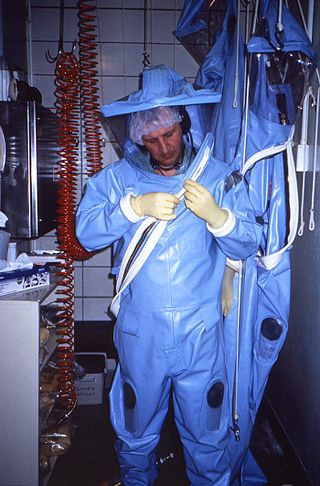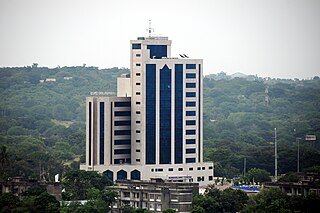Related Research Articles

Antimicrobial resistance (AMR) occurs when microbes evolve mechanisms that protect them from the effects of antimicrobials. All classes of microbes can evolve resistance to the point that one or more drugs used to fight them are no longer effective. Fungi evolve antifungal resistance, viruses evolve antiviral resistance, protozoa evolve antiprotozoal resistance, and bacteria evolve antibiotic resistance. Together all of these come under the umbrella of antimicrobial resistance.

Biosafety is the prevention of large-scale loss of biological integrity, focusing both on ecology and human health. These prevention mechanisms include the conduction of regular reviews of biosafety in laboratory settings, as well as strict guidelines to follow. Biosafety is used to protect from harmful incidents. Many laboratories handling biohazards employ an ongoing risk management assessment and enforcement process for biosafety. Failures to follow such protocols can lead to increased risk of exposure to biohazards or pathogens. Human error and poor technique contribute to unnecessary exposure and compromise the best safeguards set into place for protection.

Tularemia, also known as rabbit fever, is an infectious disease caused by the bacterium Francisella tularensis. Symptoms may include fever, skin ulcers, and enlarged lymph nodes. Occasionally, a form that results in pneumonia or a throat infection may occur.

River Nile State is one of the 18 wilayat or states of Sudan. It has an area of 122,123 km² (47,152 mi²) and an estimated population of 1,511,442. It is made up of seven localities.

The Libertarian Party of Connecticut is a statewide affiliate of the U.S. Libertarian Party. According to the bylaws posted on its web site, the Connecticut Libertarian Party has the basic aims of furthering individual freedom and opposing the initiation of force against individuals, among other things. It does this by engaging in political, educational, and social activities.

The People's Republic of China passport is a passport issued to citizens of the People's Republic of China for the purpose of international travel, and entitles its bearer to the protection of China's consular officials overseas.

The Michelin Pilot Challenge is a grand touring and touring car racing series run by the International Motor Sports Association. Originating from the Canadian Motorola Cup, the series was taken over by Grand-Am in 2001 to become the Grand-Am Cup following the demise of rival IMSA's Firehawk series of similar rules in the US. KONI became series sponsor for the start of the 2007 season when the series became known as the KONI Challenge Series, before renaming once more prior to the start of the 2009 season as the KONI Sports Car Challenge. The series name was once again changed for the 2010 season to Continental Tire Sports Car Challenge. In 2019, the series rebranded again after Michelin was selected to become the new official tire supplier of the series and thus simplified their branding name by removing Sports Car term.

The 'Keitt' mango is a late-season mango cultivar which originated in south Florida.

The 'Edward' mango is a named mango cultivar that originated in south Florida.

Visa requirements for Israeli citizens refers to regulations pertaining to visas for holders of Israeli passports.

The 'Palmer' mango is a large, commercially grown late-season mango cultivar that originated in south Florida.

The Tanzania Communications Regulatory Authority (TCRA), established by the TCRA Act No. 12 of 2003, is an independent Authority for the postal, broadcasting and electronic communications industries in the United Republic of Tanzania based in Mikocheni ward of Kinondoni District of Dar es Salaam Region. It merged the former Tanzania Communications Commission and the Tanzania Broadcasting Commission. The TCRA is accountable to the Communications and Technology Ministry. The Information Communication and Technology (ICT) sector reform in Tanzania is notable in that development was influenced by regional, political (national) and technological factors. Tanzania is one of the few African countries to liberalise the communications sector whereby the Converged Licensing Framework (CLF) is used as a key strategy, in terms of the Tanzania Communications Regulations. Since inception in 2003, the TCRA has issued a number of regulations to administer the sector, but still faces a number of challenges such as the roll-out of services to under-serviced rural areas.

The 'Julie' mango, also called 'Saint Julian', is a named mango cultivar that was made popular in the Caribbean. It is considered to be one of the best mangoes in the Caribbean.

The 'Lippens' mango is a named mango cultivar that originated in south Florida.
The racial and ethnic demographics of the United States have changed dramatically throughout its history.

2017 elections to Stirling Council were held on 4 May 2017, the same day as the 31 other local authorities in Scotland. The election used the seven wards created under the Local Governance (Scotland) Act 2004, with 23 councillors being elected, an increase of 1 from 2012. Each ward elected either 3 or 4 members, using the STV electoral system. Following the Fifth Electoral Review by the Local Government Boundary Commission for Scotland, minor changes were made to several of the ward boundaries and one additional Councillor was added moving the total number of Councillors from twenty-two to twenty-three.
References
- ↑ "Antibiotic Resistance Lab Network | Antibiotic/Antimicrobial Resistance | CDC". Cdc.gov. 2017-01-05. Retrieved 2017-05-22.
- ↑ "Archived copy" (PDF). whitehouse.gov . Archived (PDF) from the original on 2017-01-20. Retrieved 2017-01-10– via National Archives.
{{cite web}}: CS1 maint: archived copy as title (link) - ↑ "Annual Meeting Report" (PDF). www.aphl.org. 2017. Retrieved 2019-06-11.
- ↑ "Archived copy" (PDF). Archived from the original (PDF) on 2017-01-12. Retrieved 2017-01-10.
{{cite web}}: CS1 maint: archived copy as title (link)